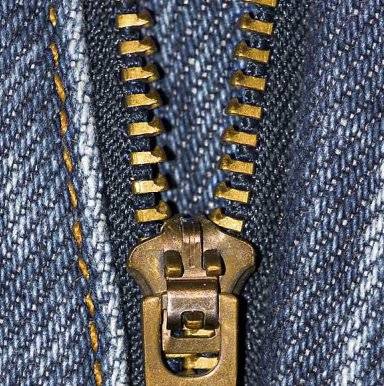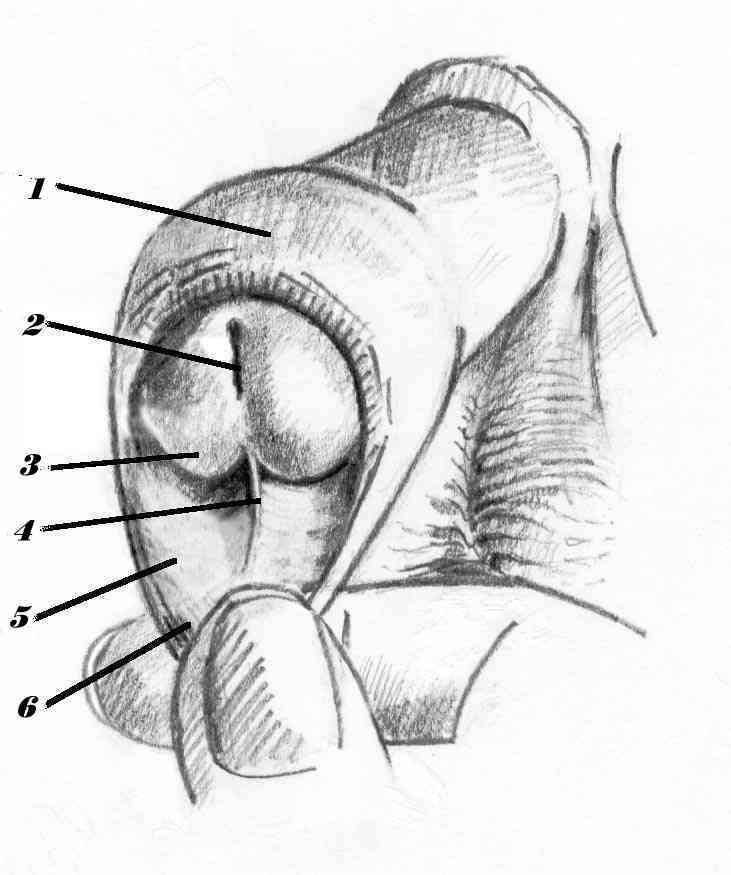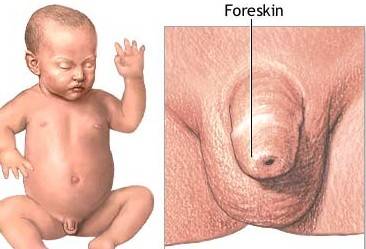 I recently fell into the habit of asking my male friends about their penises. Not having unlimited access to one myself, I’m curious about what it’s like to not only have a penis, but to have a penis that is different from the penis one was born with. Why are some of my friends circumcised while others aren’t, and what prompts some parents to opt out of such a standardized procedure? Interestingly, these questions are usually met with excitement and enthusiasm from guy pals as we suddenly become engrossed in conversations about how their appendages came to look the way they did. I’ve gained so much insight into the private world of my friends’ private parts that I started asking the same questions to new and expecting parents.
I recently fell into the habit of asking my male friends about their penises. Not having unlimited access to one myself, I’m curious about what it’s like to not only have a penis, but to have a penis that is different from the penis one was born with. Why are some of my friends circumcised while others aren’t, and what prompts some parents to opt out of such a standardized procedure? Interestingly, these questions are usually met with excitement and enthusiasm from guy pals as we suddenly become engrossed in conversations about how their appendages came to look the way they did. I’ve gained so much insight into the private world of my friends’ private parts that I started asking the same questions to new and expecting parents.
The World Health Organization (WHO) estimates about 30% of men are circumcised worldwide, yet the procedure of removing the foreskin (usually within 48 hours of birth) is general practice in American hospitals, with an estimated 60-75% of American-born males circumcised every year. While circumcision has been ritualized by many religions for centuries, its non-religious practice became popularized in American hospitals by the 1930s. The alleged health and hygiene benefits of foreskin removal have been heartily challenged in recent decades with the advent of frequent bathing and new developments in understanding the acquisition of sexually transmitted infections. Human rights groups have contested the acceptance of circumcision as a “normal” practice, citing consent, physical pain and emotional trauma as a few of the many ethical dilemmas inherent in conducting the procedure on male infants. However, advocates argue health benefits of circumcision not only outweigh the risks, but the simple procedure has become so common in the U.S. that many parents fear a non-circumcised child will be teased about his foreskin.
Without engaging in the debate of whether one option is better or worse than the other, I was delighted that five male friends and three parenting couples were willing to share their foreskin stories with me. One could assume a random sampling of males I know would yield fewer foreskinned friends than circumcised, but of the five males I asked to talk about their penises, four are uncut.
Foreskin frenzy
Edward (24, graduate student), Nathan (28, IT), Matthew (31, graduate student) and Hoss (26, Lawyer) were all brave enough to shed some light on a few of the questions I had about being American males with foreskins.
Emma Reaux: Okay guys, I don’t have a penis. Tell me what it’s like to have one.
Edward: 95% of the day you don’t notice it. Every now and then, you have to adjust, due to sitting in an awkward position or an involuntary erection. Also, it makes peeing easier, and you can write fun things in the snow.
Nathan: Zippers are a little dangerous at times, but other than that I really have no complaints.
Matthew: Women like it when I put it in them, which works great because I like putting it in them.
Hoss: The world is my toilet! Also, my penis has gotten me into a lot of trouble, because it has an amazing ability to control my thoughts.
ER: When did you first notice that not every male child has a foreskin?
E: The first time I saw my best friend in elementary school naked.
N: When I was seven, I walked in on my best friend changing and noticed he was not quite the same as I.
ER: What conversations did you have with your parents as a child, teen, or adult about not being circumcised?
H: My mom is Jewish which makes it all the weirder to have an anteater, but she said she and my dad had a conversation and thought that circumcision was barbaric and did not want to put my brother or myself through it, though obviously we would not have remembered.
N: My parents were not very open about sexuality or anything related to it, but they made sure I knew how to keep myself clean and healthy.
M: I was actually born in Europe, where most people are uncut, so this was never brought up.
ER: Why did your parents choose not to circumcise you? (If you haven’t asked, call up right now and ask your mother!)
N: My parents decided not to have it done for multiple reasons. Since my first conversation about this with you, I have learned that my father is not circumcised. I was also born premature, so any unnecessary risks to my health were avoided, especially surgical procedures like circumcision. Neither of them had any strong religious convictions either way and decided together that they didn’t want it done.
M: Europeans don’t believe in genital mutilation (or free soda refills).
E: The answer, as I recall, was something along the lines of “we didn’t see any point in it.”
ER: Do you have brothers? Are they circumcised? What about your father?
E: I am almost positive my brother and father are not circumcised.
N: My brother, like me, is uncircumcised. My father is not. I didn’t find this out until recently.
M: No siblings, and my father has his foreskin. My family has a strong tradition of not chopping off body parts upon birth.
H: My brother is not circumcised, but my dad is.
ER: Many arguments for circumcision (outside of religious contexts) cite hygiene issues and increased risk of STI transmission for those with foreskins. Did you ever feel you were at an increased risk for poor health outcomes due to your foreskin? 
N: I am a pretty clean guy, and have never had a problem with keeping it clean. I have never had an STI, but that may have more to do with being selective about my partners and always using condoms and safer sex practices.
M: Hygiene was never an issue: everything gets washed just like any other body part. As far as an increased risk of STI transmission, even if those studies are correct, they are often done on populations where condom use is scarce. So they’re not applicable to the safe-sex practicing gentleman such as myself.
H: I worried for a bit as an adolescent, because I heard the stories, but I think it just makes you more cognizant of the risks, so you take better care of it. In that sense, it is almost healthier, if I may be so bold as to claim.
E: I have circumcised friends who tried to convince me that I was at greater risk, but I have come to the conclusion that this is just common opinion, rather than the result of their own research. So I’ve decided that no, I’m not really at risk. Admittedly, I haven’t done much research myself.
ER: What are your thoughts about the assumption that circumcision is just “normal” in our culture and that “most” males are circumcised, so we should just keep up with the practice?
H: I would agree, it has definitely become the norm, even outside of religious contexts, and you feel a little weird being different. Some girls are into it though, because it is different. I have had several girlfriends play with it, just out of curiosity, like they are seeing a penis for the first time.
M: There are good traditions and there are bad traditions. Given how much the foreskin enhances pleasure, I find it unreasonable to support the practice of circumcision. Besides, if someone wants, he can get circumcised at any point in his adult life.
ER: Many parents who are trying to decide about circumcision for their male children worry about teasing in the locker room, or similar scenarios. Did you ever experience anything like this, and how did you handle it?
E: I don’t know if I’ve been overtly teased, but I have felt “different” for most of my life. The guys I’ve told about it have usually acted surprised, as if being uncircumcised is bizarre and unorthodox. It has made me, and continues to make me, a bit self-conscious in locker rooms.
N: In all the schools I went to everyone was very modest, and more apt to make fun of you for “being gay” if you even looked at some else while getting dressed. We actually were only required to take showers before and after swim class, and we did that in swimsuits, so no real problems ever arose.
M: While I did not, I’m sure that others have. But so what? Fat kids, short kids, and ginger kids get made fun of as well, but you don’t see many mothers eager to cut off little Timmy’s belly fat.
H: I never experienced any teasing in the locker room. Most guys are already awkward being naked groups, and then it just turns into all of the regular locker room shenanigans. Plus, guys are assholes to begin with, and there is never a dearth of things to make fun of their buddies for, so potential teasing is not really a good reason to circumcise.
ER: How has having a foreskin impacted your personal pleasure and/or sex with yourself?
H: Allegedly, you get greater sensitivity from not being circumcised. I obviously only have the one penis, so I can’t really compare.
M: It’s a lot easier to masturbate if you have foreskin, since the sliding action of the skin means that you might not require as much lubricant. The foreskin is also very sensitive, providing for more pleasure while masturbating.
ER: How has it impacted your sex life with others?
E: This is where I think my case is somewhat unique. My foreskin is abnormally tight about the tip, which makes retraction uncomfortable when flaccid and impossible when erect or partially erect. For this reason I don’t clean under the foreskin as often as I probably should, but I have never experienced an unnatural buildup of dirt or smegma. My foreskin is fine when masturbating, but sex requires lubrication, and even then care must be taken when penetrating so that the foreskin does not pull too tightly.
H: It has never prevented me from sleeping with someone, but there is a brief consideration in the beginning and invariably a conversation about it. Anyone who is sleeping with me has to be understanding anyway, and forgiving, so it is never a deal breaker.
M: Most of my experiences were positive. Only once was someone confused by it after the fact, but that didn’t affect the experience. Everyone else was either excited or neutral.
ER: Has it increased communication with partners?
M: Since a lot of women asked me if they needed to do anything differently while performing oral sex, I’d say that being uncut has helped with communication. The answer is no, by the way.
H: Outside of normal conversations about girth, flavor and length, it is a conversation piece at the head of your penis, which probably leads to more open sexual conversations, including talks about STIs.
E: My partner and I have certainly discussed circumcision and the issues my tight foreskin causes with respect to sex. She has also encouraged me to make sure I am clean so that I don’t give her any sort of infection.
ER: Is it something you tell partners about before the pants come off, or do you just let them figure it out?
N: I used to tell them beforehand, but when I stopped treating it like it was a big deal, it usually no longer was.
M: I rarely mention it. When the penis is erect, one retracts the foreskin and there’s no difference between cut and uncut males. When the condom is put on, there’s no difference at all. Otherwise, like with oral sex, women have figured it out just fine.
H: I always let them figure it out. If you stop before taking your pants off it makes it a much bigger deal than it actually is, and makes the other person more aware of it than if they just find out for themselves.
ER: Have you ever had a partner who reacted very strongly (negatively or otherwise) to your foreskin?
M: I’ve had some women get excited since they’ve never had sex with an uncut guy. Seems to be kind of a novelty ’round these parts.
H: Nothing outside of curiosity. I once had a girl drunkenly throw me on a bed and start unzipping my pants as she said, “I want to see your penis.” That was pretty awesome, but is really the only memorable reaction.
N: I have had both negative and positive reactions. The negative reactions were never really all that bad-more or less a look of surprise that caught me off guard, or maybe a small comment because the partner had never been with someone uncircumcised. No one has ever been mean to me about it, or refrained from having sex with me because of it. A recent partner actually made me feel good about it, which is a welcome first. I was surprised when she said she thought it was “awesome” that I am uncircumcised. I haven’t felt as comfortable with previous partners as I have been with her.
ER: Have you ever considered getting a circumcision? If so, what thoughts or events led you to that consideration? If not, describe why you are totally comfortable with being uncircumcised.
E: Because of my tight foreskin, I have considered getting a circumcision in order to make intercourse easier, but at this point, it’s not worth it to me.
N: Yes, I have considered it. I think everyone worries if they are “normal.” I really couldn’t bare the thought of actually having what I feel is unnecessary surgery to “fit in.”
M: Based on my experiences, the fact that I’m uncut plays virtually no role in my sex life with others, and only enhances the pleasure. I’m totally comfortable with being uncircumcised.
H: I have thought about it, but the pain and money have been deterrents. By now it is just one of those things I have, but maybe someday I would.

ER: If you had a son, would you circumcise him? Why/why not?
N: Absolutely not. Some people would go as far to say that its genital mutilation, but I just can’t see any reason to remove something evolution has granted him to have.
E: Probably not, for the same reason my parents didn’t, I see no compelling reason.
M: No, I’d want him to make the choice.
H: I think I would, for the normalcy of it, especially by the time I pop out kids. And while it would be difficult to see a son in pain, I think that in the end it is probably the right choice. I don’t have a real justification for it, it just feels right.
ER: What would you like to tell couples and future parents who are weighing the options about circumcising their sons?
E: You could circumcise your son in order to ensure he doesn’t get teased about his foreskin, but kids always get teased about something, so I don’t see this as a good reason. Unless you have a good reason, religious or health-related, I’d say don’t bother.
N: This is a fairly personal decision, but if you are worried about your child being disadvantaged in any way, don’t. I have lived a perfectly normal and wonderful life with my foreskin intact and I can’t comment on what it would be like without it, but I enjoy the way things are and wouldn’t change that part of my body for any reason.
H: It is a personal decision based on a lot of factors, so it is not really for me to say. It has not negatively or positively affected my life that greatly, so if you think it is right one way or the other that is the choice you should make.
M: Don’t buy into the stupid arguments about cleanliness or whatever else people say to keep up this outdated tradition. A dirty circumcised penis is still a dirty penis, so you’re much better off teaching kids about hygiene. Keep the turtleneck on, and be proud!
Check back tomorrow for Part 2 when I ask new and expecting parents about the process of deciding their sons’ foreskin futures.








